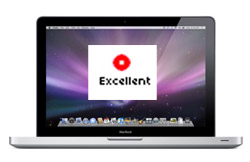Consumer Reports: Macs Are Best. Take Our Word For It!
Sign up to receive The Snapshot, a free special dispatch from Laptop Mag, in your inbox.
You are now subscribed
Your newsletter sign-up was successful
Consumer Report's June rankings for laptops are out, and Microsoft isn't going to be too pleased. While the company's aggressive advertising campaign emphasizes PCs' low cost, Apple MacBooks dominate the upper echelon of the organization's rankings.
The report, which is available on the Consumer Reports site, but only to subscribers, encompasses performance, design, versatility, battery life, screen quality, and technical support. Unfortunately, the ratings are so biased and the rating system so opaque, it sounds like CNBC's Jim Goldman was running the Consumer Reports test lab.
High Ratings for Macs
In the 13-inch category, the leaders were the Unibody MacBook, the MacBook Air, and the last-generation plastic MacBook with scores of 62, 60, and 55, respectively. The HP Pavilion dv3 came in fourth place, just behind the plastic MacBook. More on the wacky scoring system further down.
The MacBook Pro led the 15-inch category with 75 points, followed by the Toshiba Satellite M305, which won 64 points. The Sony VAIO FW from Microsoft's third PC ad received a score of 62 points.
In the 17-inch category, the MacBook Pro steamrolled the competition by an even wider margin, winning 80 points when the top PC got 64. The HP Pavilion dv7 from the first PC ad got 54 points, placing fourth.
Now, for the analysis: I call shenanigans. (Full disclosure: I own a Mac, and love it, and I still call shenanigans.)
Sign up to receive The Snapshot, a free special dispatch from Laptop Mag, in your inbox.
Granted, we've given our Editors' Choice award to the Unibody MacBook and the 17-inch MacBook Pro. The 15-inch MacBook Pro won a high rating as well.
But the MacBook Air? Seriously, Consumer Reports? That makes us wonder how high a priority battery life actually was, particularly on a machine with such a small screen size. For us, the two-hour-and-eight-minute battery life was enough for us to give it just 2.5 stars, a rating which translates to us not recommending it.
And that's only the tip of the iceberg. When we logged into Consumer Reports, we sorted the rankings to include only notebooks they've tested. The grand total for the 13-inch category? Six. Six reviews in total, three of which were not Macs. That's not even counting the untested notebooks on the list.
Not Much To Say, But Take Our Word For It!
Moreover, while you can see icons indicating how well a notebook did in a particular area, such as ergonomics, there are no accompanying explanations. The reviews themselves are little more than lists of specs and blurbs for highs, lows, and a verdict. The overall scores are just totals of numbers given for each of the criteria, which are reflected in explanation-less icons. The MacBook Air review, for example, shows a performance rating of
(otherwise known as "Good") and a display rating of
("very good"). We have no idea what criteria they used to come up with these ratings as we could not find a place on the Consumer Reports site that lists benchmarks or testing methods they used.
To really flesh things out for the reader, there are also 126 words of expert editorial insight on the MacBook Air, which includes a 48-word "CR's Take" along with brief highs and lows (aka pros and cons). Is 126 words plus some wacky icons enough information for readers to make an informed decision and plunk down thousands of dollars on a MacBook? Does it even justify the cost of subscribing to Consumer Reports? The lack of content and insight here make it look like Consumer Reports barely spent any time with the system and certainly didn't spend much time with competitive systems.
I assure you, I have a point here, and it's not just to toot LAPTOP's horn for publishing more thorough notebook reviews (and more notebook reviews, period). What disturbs me most is that Consumer Reports, the publication that eschews ads for the sake of appearing fair, is perpetuating the Mac-is-best zeitgeist without any analysis or transparency to back it up.
I won't get into whether Macs really are better. We've had that debate before (seven rounds, of them, in fact), and have debunked (or at least softened) some of the criticisms leveled against PCs, including their dependability.
But what if Macs are better in some ways? What if, as Apple implies in its campaigns, that they're more secure, easier to use, and cooler? Isn't it the job of notebook testers to, you know, test all that, and then qualify it?
Via Apple Insider
Dana Wollman was a contributing writer at Laptop Mag. Her coverage included reviews of some of the most iconic laptops from the previous decade, such as the Dell XPS, Dell Studio, HP EliteBook, and MSI Wind. She focused on smaller netbooks and productivity-oriented devices. After Laptop Mag, Dana worked as an Editor-in-Chief at Engadget, and is now a Senior Technology Editor at Bloomberg.



